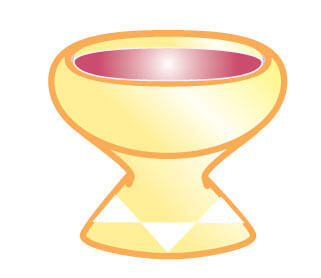
Sunday Readings: Isaiah 53.10-11; Hebrews 4.14-16; Mark 10.35-45
James and John, the sons of Zebedee, asked Jesus, “Teacher, we want you to do for us whatever we ask of you.” Jesus said, “What is it you want me to do for you?” “When you sit on your throne in your glorious kingdom, we want to sit with you, one at your right and one at your left.” “But Jesus said to them, “You do not know what you are asking. Can you drink the cup that I drink, or be baptized with the baptism that I am baptized with?” They answered, “We can.” – Mark 10.35-39
Three times Jesus tells those who are journeying with him to Jerusalem that he will suffer, die, and rise after three days. Each time Jesus’ disciples object. First, Peter and Jesus scolds him. The second time lead to talk among the disciples about who is greatest. Sunday’s gospel describes what happens after Jesus’ third attempt to correct their image of the kind of messiah he is.
Each prediction widens the irony between hearers of the gospels like us, who know how Jesus’ story turns out, and disciples within the narrative like James and John, who don’t have a clue who Jesus really is and what following Jesus will demand of them. Mark’s gospel deliberately makes Jesus’ inner circle of disciples — Peter, James, and John — unenlightened about the meaning of discipleship.
James and John imagine the glory of following the messiah, the victories, the status, the revival of the nation. They seek the top positions in Jesus’ kingdom at his right hand and left hand. Jesus recognizes that the two brothers don’t know what they are asking. Jesus question them, “Can you drink the cup I will drink?” They respond with brash certainty, “We can.”
James and John imagine sharing a cup of victory, not of suffering. When Jesus prays in the garden, they sleep; when Jesus is arrested, they flee. Yet, they are also right about themselves; they do give their lives to spreading the good new of Jesus’ resurrection from the dead. Mark wants us to recognize that Jesus’ first disciples grow into their commitment as we can.
This brash commitment, possemus, in Latin; we can, in English, is the motto of the Sisters of St. Joseph. At every eucharist we drink the cup that Jesus drank. We brashly say amen, affirming this is the lifeblood of Christ poured out for us. It becomes part of us, a commitment to live into each day.
What are your spiritual ambitions? To what have you said a brash yes and only later discovered it demanded more than you anticipated?